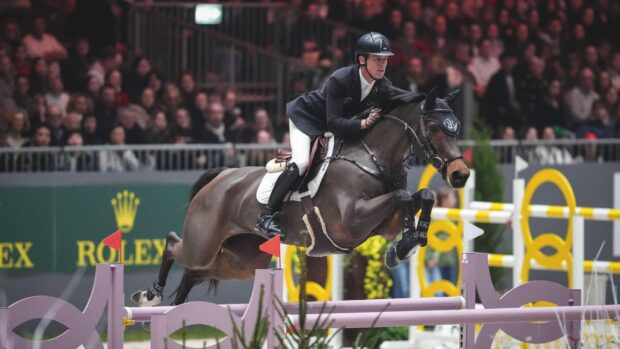Five horses put down after shipment intercepted
Sick horses and unhandled foals who had been crammed into an unsuitable lorry have been intercepted in Britain, following a journey from Ireland. Five Irish thoroughbreds who were on board had to be put down. The horrific discovery included a foal, who had fallen over and been unable to get back on its feet, as well as some who ere being transported legitimately. Several horses had strangles, two also had pneumonia, and the three “terrified” unhandled foals (pictured, top) were matted with faeces. Of the 20 horses, a total of seven, who were in better health, were claimed by their owners. The remaining eight were abandoned – including a pregnant mare and the foals. The charity suspects some were being smuggled for fattening and slaughter, despite the fact live exports for slaughter from the UK were banned in May 2024. World Horse Welfare chief executive Roly Owers said: “We make no apology for sounding like a broken record, and pretty much on the 12th anniversary of the horsemeat scandal, without a proper, robust digital equine identification and traceability system in the UK and across Europe, the welfare of equines being transported will never be fully protected.”
Eventing safety
Debate surrounding penalties for breaking a frangible device resurfaced at the recent FEI eventing safety seminar. As technology develops, so too do questions over whether current penalties are fit for purpose. Frangible devices are progressing all the time, as is video tech and sensors. One major talking point was whether there could be different rules at the upper levels of international sport, which would allow a review of penalties for “soft” activations – rather than the blanket 11 penalties. Five-star rider David Doel was among the many leading names involved in the discussion and pointed out that there is precedent for this in other sports. He gave the example of football, where VAR (video assistant referee) is used in the Premier League.
Find out more about the discussion
Tribunal rules in doping case
A supplement given to a horse at the Paris Olympics on the advice of a team vet led to a positive drug test and disqualification. Belgian event rider Tine Magnus had categorically denied ever doping after the anti-depressant and anxiety medication trazodone was found in her Olympic ride Dia Van Het Lichterveld Z’s system at Paris 2024. Following the FEI Tribunal’s decision on 31 January, Ms Magnus said that she “can confirm and declare with my head held high that I have never consciously used doping”. Each rider is considered the “person responsible” for their horse under the FEI’s anti-doping rules. Despite the fact the FEI Tribunal found Ms Magnus bore “no significant fault or negligence” for the positive finding, she was suspended for five months – which was backdated to the start of her provisional suspension and so ended on 2 February – and fined CHF 4,000 (£3,540). The mare was provisionally suspended for two months in 2024 (3 September to 3 November). Her individual results, and the team, are disqualified from the Paris Olympics.
- To stay up to date with all the breaking news from major shows throughout 2025, subscribe to the Horse & Hound website
You may also be interested in:

‘We’re delighted to bring loyal readers this benefit’: H&H magazine subscribers get free website access

Hundreds back call for change after Olympic rider has ‘probably the worst fall of my career’

Kim Bailey: ‘The good, the bad and the ugly…’

Hobby horse riders to join Olympians at first international event of the season




